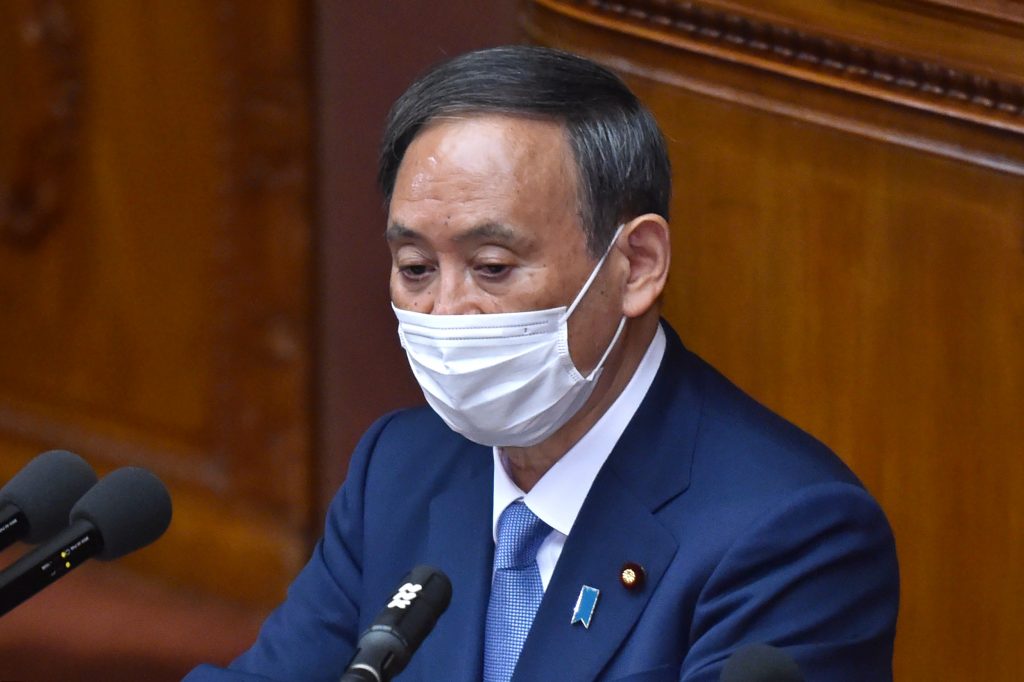
- ARAB NEWS
- 24 Aug 2025

TOKYO: Japanese Prime Minister Yoshihide Suga showed on Tuesday the government’s intention to decide Thursday to declare a fresh state of emergency over the novel coronavirus for Tokyo and three neighboring prefectures.
The emergency declaration will be issued within Thursday. Suga unveiled the plan at an executive meeting of his ruling Liberal Democratic Party in response to a surge in coronavirus cases in Tokyo and the three prefectures adjacent to the Japanese capital–Saitama, Chiba and Kanagawa.
The government is considering revising a relevant ordinance to allow the governors of the four prefectures to disclose the names of eating and drinking establishments refusing their requests for temporary closures or shorter operating hours that will be made under the state of emergency. It will also study introducing stricter restrictions again on the number of visitors to large-scale events in the four prefectures.
It will be the second state of emergency over the virus in Japan. The first emergency declaration was issued on April 7 last year, initially for Tokyo and some other prefectures. It was expanded to cover all other prefectures as well on April 16 and lifted in stages in the following month.
Business restrictions will be imposed on eating and drinking facilities, where infection risks are high, as Suga has said that implementing coronavirus measures intensively in limited areas will be effective in curbing the spread of the virus.
In line with the declaration of the fresh state of emergency, the state will revise its basic policy against the coronavirus that will be used as guidelines for countermeasures by the central and local governments. The state of emergency, to be declared based on the special measures law against the coronavirus, will likely be in place for about a month.
Suga told the LDP executive meeting: “What people want most from the government and the ruling camp is ensuring safety and giving hopes. We’ll work hard on coronavirus countermeasures as the highest priority.”
On Thursday, the government plans to hear opinions from members of an advisory panel of experts while notifying the Diet, the country’s parliament, of its plan to declare a state of emergency in advance.
Later in the day, the government will hold a meeting of its coronavirus response headquarters, and Suga will put the emergency declaration into force at the meeting. The prime minister may hold a press conference within Thursday to explain details to the public.
On Tuesday, a government task force on the epidemic, in an emergency proposal, called for a state of emergency to be declared soon for the four prefectures. “If the coronavirus situation in the Tokyo metropolitan area does not subside, infections could increase rapidly across the nation,” the task force warned.
Referring to remote work, economic revitalization minister Yasutoshi Nishimura told a press conference on Tuesday that the government’s basic policy used during the previous state of emergency called for reducing the proportion of commuting workers by 70 pct.
“It will be reasonable to implement a similar measure this time as well,” Nishimura, who is in charge of the government’s coronavirus responses, said, suggesting that the government will again urge companies to promote telework.
Nishimura said that the lifting of the state of emergency may be considered if the infection situation goes down to Stage 3, the second-worst level on the four-tier scale gauging the degree of the spread of the virus.
The government plans to submit to the regular Diet session to be convened on Jan. 18 a bill to revise the coronavirus special law including financial benefits to businesses accepting requests for temporary closures and shorter operating hours, and penalties on noncompliant businesses. It hopes the amendment will be enacted in early February.
On Tuesday, the government kicked off talks on specifics with the ruling and opposition camps.
The ruling side proposed the introduction of penalties on eating and drinking facilities failing to accept requests for closures and shorter business hours. The largest opposition Constitutional Democratic Party of Japan argued that sufficient compensation should be paid as a condition for introducing such penalties.
Further discussions will be held on Friday.
In a related move, the Union of Kansai Governments, comprising eight western Japan prefectures, including Shiga, Kyoto, Osaka, Hyogo, Nara and Wakayama in the Kansai region, and four ordinance-designated major cities, adopted on Tuesday a declaration urging residents to refrain from traveling to and from Tokyo, Saitama, Chiba and Kanagawa.
The declaration, designed to prevent the spread of the virus in the region, also included requests for residents to refrain from holding dining sessions before or after coming-of-age ceremonies and other events and to promote work from home.
Wakayama Governor Yoshinobu Nisaka, who serves as head of the union, said that the emergency declaration for Tokyo and the three prefectures is “inevitable” as coronavirus infections are continue to increase in the metropolitan area.
The union also confirmed that it will not request the central government at the moment to issue a coronavirus emergency declaration for the Kansai region.
If new infection cases surge in Kyoto, Osaka and Hyogo, which have large populations, however, their governments may seek the state’s emergency declaration for the prefectures.
JIJI Press